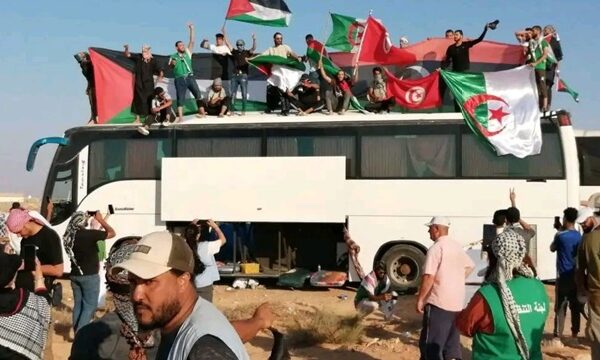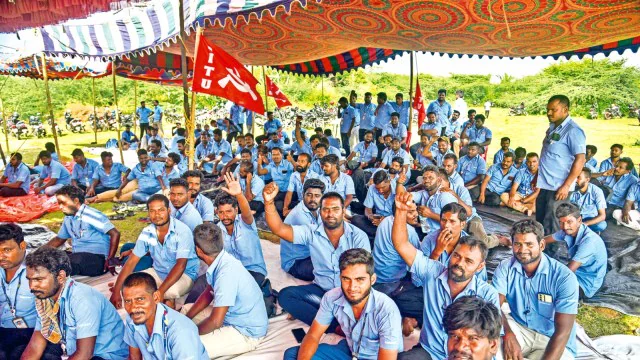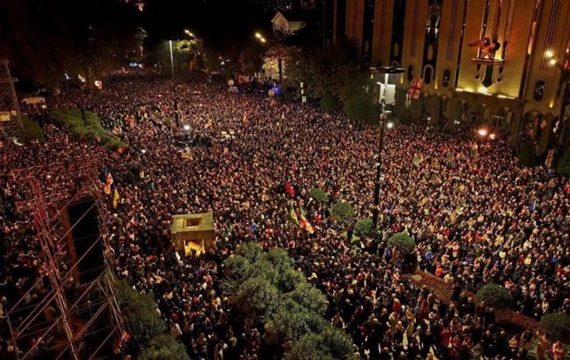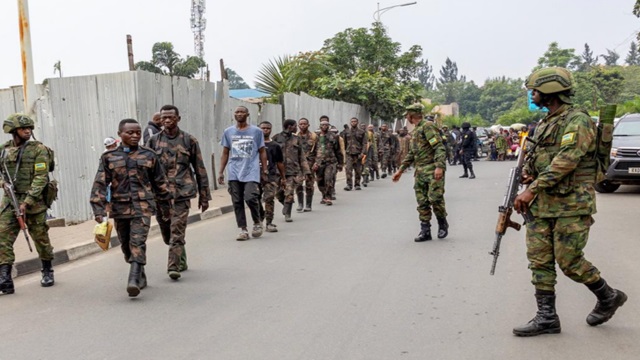18 June 2025
Since last week, we have been following the exceptional event of the Caravan of Steadfastness, which set out from Algiers and Tunis on June 8–9. This convoy, even if only briefly, unified the masses in the region, inspiring solidarity, collective organization, and grassroots decision-making. From that point of view, one can say it partially succeeded in its mission, despite the many obstacles it faced—especially upon entering the areas controlled by Khalifa Haftar’s militias in Libya.
The Palestinian cause has surged to the forefront of mass political and humanitarian concern, leaving a profound impact on global public opinion. It has forged a new consciousness, especially for younger generations who have directly witnessed the horror of this genocide in a small part of the world —unfiltered and undistorted. The entire world has seen one of the most grotesque and brutal wars, and yet it continues despite the tireless efforts of countless people everywhere. Despite all the support and solidarity for Gaza, the crimes of the Zionist government continue and have persisted for more than a year and a half.
What the Zionist state —embodied by Netanyahu’s government, and facilitated by its collaborators across a large portion of the world’s ruling classes— does with its arrogance against oppressed and colonized peoples, is being met with the resolute conscience of people who call for liberation: from the siege, from ethnic cleansing, and from one of the worst massacres of the century. We cannot ignore the millions who have taken to the streets in numerous countries, denouncing Netanyahu’s barbarity and demanding an end to the bloodshed of innocents.
This wave of struggle and broad solidarity —particularly the support from Tunisian, Moroccan, and Algerian masses, and from all the peoples in the region— was the driving force behind the convoy. It became a test for its organizers and participants to persist and not retreat until they reached the Rafah crossing.
The Palestinian cause: a barometer of Arab solidarity
Many activists, left-leaning organisations and ordinary people in Egypt have welcomed and blessed the convoy. They held protests demanding it be allowed to cross the western Libyan border into Egypt and move toward Rafah. But betrayal and submission to reactionary forces proved stronger than these voices. Many who had flown into Egypt to take part in the global solidarity movement (Global March to Gaza) were surrounded, had their passports confiscated, were assaulted, and then threatened with forced deportation.
These scenes remind us, in logic if not in scale, of the siege tactics imposed by the Zionist government on the West Bank and Gaza. They come as no surprise from capitalist governments that effectively abide by the far-right dictates of this regime and of its Western backers. Yet amid this betrayal and blockade, demonstrations erupted in Tunisia and several provinces over two days to support and help the convoy continue its journey to Rafah.
Marxists have emphasized through their statements and analyses that successful revolutions in the Middle East and North African countries and the liberation of their peoples—by overthrowing the client regimes with the organized strength of the working class—are an essential ingredient in the liberation of the Palestinians. This would shift the regional class balance of forces and profoundly alter the course of the Palestinian struggle.
The slogan “The people want to overthrow the regime,” since the revolutionary uprisings of 2011, has remained the most relevant and accurate expression of the aspirations of the region’s masses. However, setbacks, counter-revolutions, coups, and the unreadiness of the masses and the working class have delayed this outcome. That slogan lost its luster when it was hijacked by populist forces and ruling dictatorships. But today, in contrast, it seems more grounded in reality than ever —especially with the growing realization of the artificiality of the region’s borders and the potential for building common links stronger than the illusions fostered by neo-colonial regimes.
The Caravan exposes local regimes, and provoke more brutality from their henchmen
The Caravan’s initiative exposed the lies and collaboration of these regimes. From the moment the Egyptian Foreign Ministry issued a statement claiming it could consider allowing the convoy to enter by land only if it fulfilled “necessary administrative conditions” (i.e., applying for visas from the country of origin and other absurdities), militias began mobilizing. This led to disruptions in the convoy’s movement, especially near the entrance of Benghazi, close to the Egyptian border.
The convoy was held up for more than two days without media coverage or internet, deprived of food and water for long hours, and even denied the basic right to relieve themselves —especially the women— subjected to humiliation and harassment. The militias even pointed weapons at them and threatened to kill them, despite the convoy’s peaceful and humanitarian nature. Yet, the convoy’s participants and organizers demonstrated remarkable composure and discipline.
These vile actions by Haftar’s forces reveal that these regimes are, as some have put it, “even more Zionist than the Zionists themselves”, just like the —now deposed— Syrian Assad regime, the Egyptian Sisi government, the UAE, and others who leave behind a legacy of shame that cannot be erased. These practices only fuel the anger of the masses and make it ever clearer who the true enemies of the region’s peoples are.
This suffering experienced by the Arab and broader Middle Eastern peoples is nothing but the accumulation of pressure that will one day explode into liberation. But that liberation needs clear-headed leadership and cadres who can guide and organize the masses, ensuring the movement doesn’t lose direction. We saw this, on a small scale, in the courage and discipline of the convoy’s organizers, even amid betrayal, abductions, and sabotage as they approached Benghazi.
The lessons offered by this convoy are building blocks for erasing these artificial borders. This movement may well be the start of forging stronger ties between the working, poor and oppressed peoples of the region, and of reexamining their mutual relationships and collective future amid global upheavals and major shifts.
A false division enforced by reactionary regimes
The divisions imposed on the peoples of the region are the product of imperialist partition and sustained by decades of rule by reactionary, client regimes. These regimes are infiltrated by bourgeois interests and powerful families who impose control, entirely divorced from the region’s cultural fabric and traditions of solidarity.
Take Libya, for example: at its core, the people are known for generosity, support, and hospitality —something the convoy found at the beginning of its journey in areas like Zuwara and Misrata. Thus, when the convoy was met with rejection and siege by certain militias later, coordination was made with people in the East to return and stay until a decision could be made.
In the end, the organizing committee decided to return to Tunisian soil. This came after they encountered a total border closure and absolute refusal to let them enter Egypt. This decision was taken due to the impossibility of continuing, especially since Haftar’s militias not only blocked the convoy but escalated to assaulting participants, brandishing weapons, and even kidnapping several members.
Faced with this siege and intransigence, the Caravan retreated to a safe zone in eastern Libya, 50 km away from the militia-controlled area. The organizers stressed that they would not return unless all the kidnapped Libyan, Algerian, Tunisian, and Sudanese participants were released. They stated that the convoy had achieved half of its mission —mobilizing the region’s peoples and encouraging them to take their fate into their own hands. This was embodied in the solidarity, assistance, and support it received—despite the malicious skepticism and criticism from some regime-aligned voices.
The convoy has shown the importance of working class solidarity, collective thinking, and international coordination. None of this is disconnected from global struggles, as without the global call and international mobilizations, perhaps this idea wouldn’t have taken shape. Campaigns like the international boycotts, ongoing actions against transport and shipping companies involved in arms deliveries (like the French dock workers who recently blocked the shipment of military equipment bound for Israel at the Marseille port) and other protests have had a significant impact —culminating in this current movement to launch convoys and ships aimed at lifting the siege, ending the genocide, and breaking the chains of the Palestinians’ oppression.




